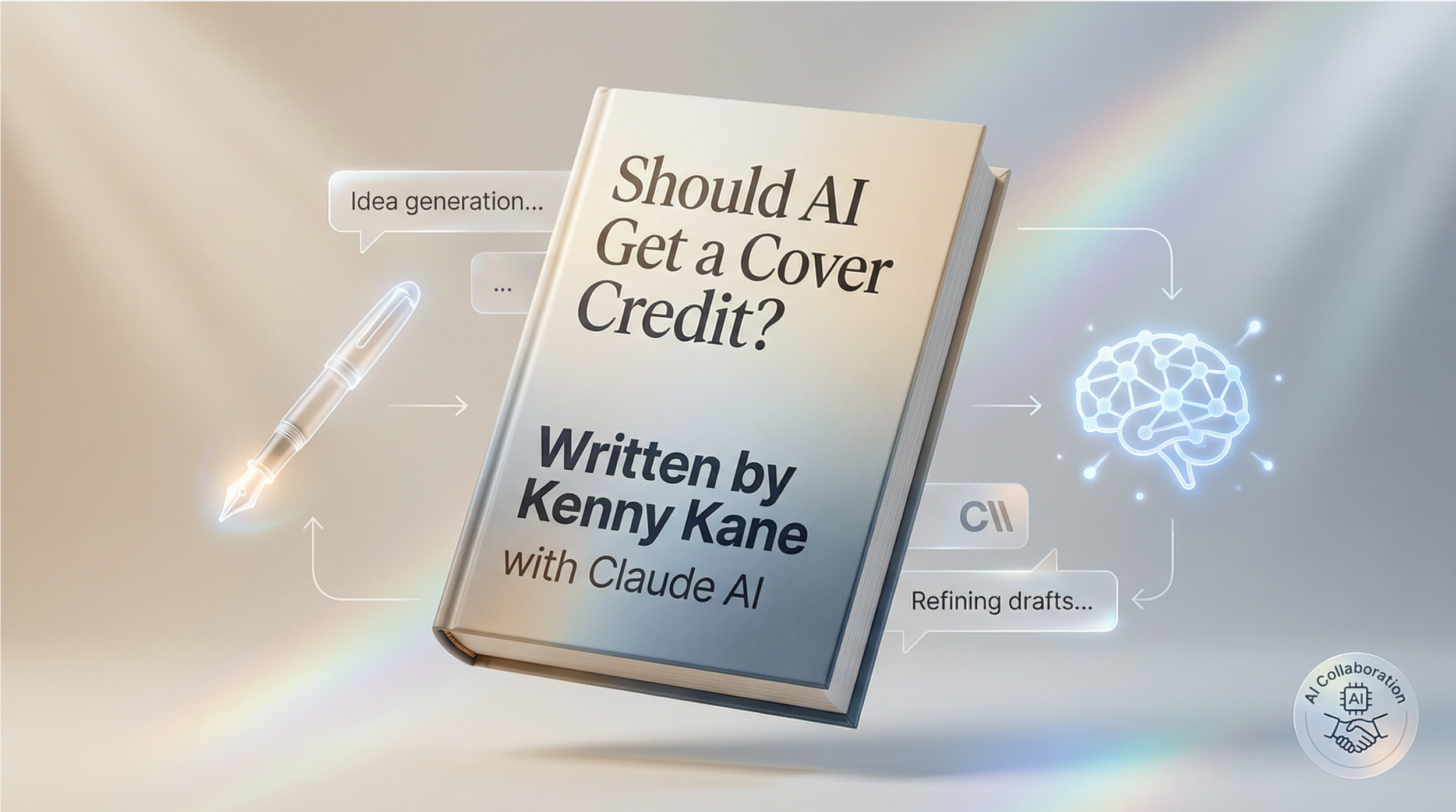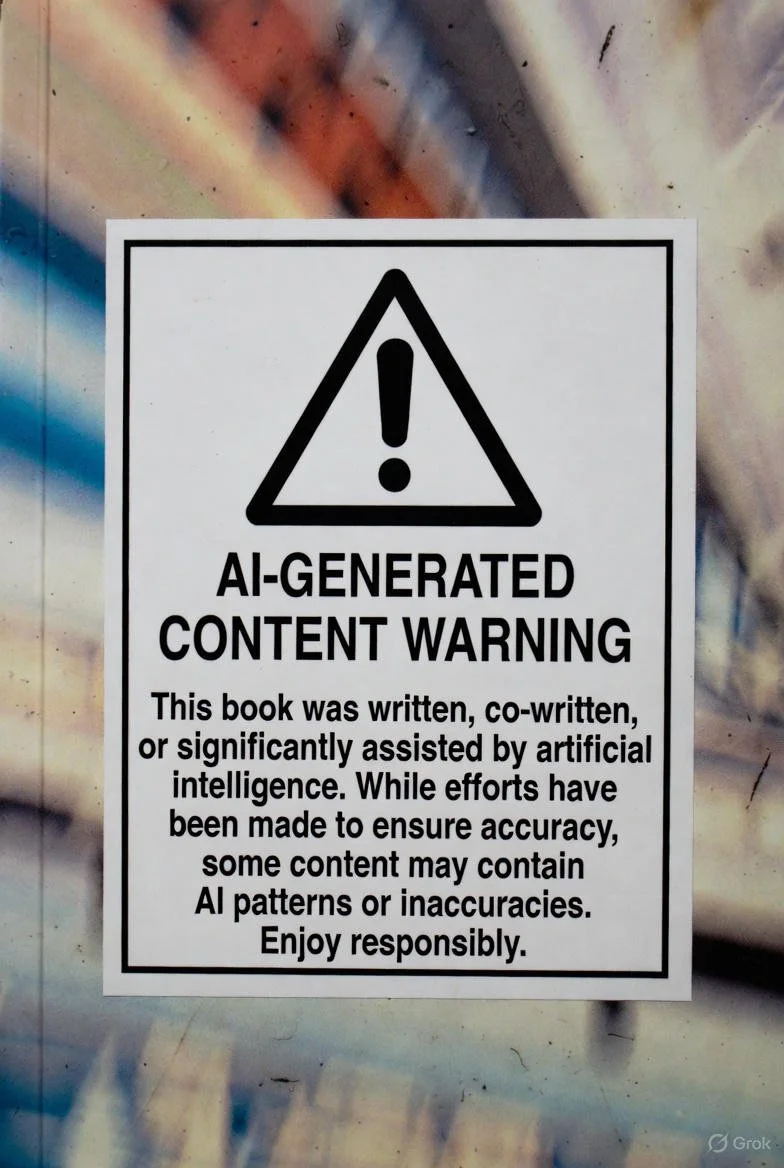Should AI Get a Cover Credit?
Here's a question I've been wrestling with: if I use Claude to help me write a book, should that go on the cover?
Not buried in the acknowledgments between my coffee maker and my dog. On the cover. Like those black-and-white Parental Advisory stickers that started appearing on albums in the 90s — a warning label signaling that something inside might be... different.
It sounds absurd when I put it that way. But the conversation around AI and writing has gotten so charged that I think we've lost the plot on what "assistance" actually means.
Where exactly is the line?
I used Grammarly for years. It catches typos, suggests restructuring sentences, occasionally flags that I've used "actually" four times in one paragraph. Nobody has ever suggested Grammarly deserves a co-author credit.
When I wrote for BigCommerce and Practical Ecommerce, my editors did far more invasive work on blog posts — restructuring arguments, cutting sections that weren't landing, pushing me to rethink how I was framing things. The published piece was better because of them. Sometimes significantly better. But the byline was still just my name. That's how editing works.
And then there's the ghostwriting industry, which has quietly existed for decades. Business books, celebrity memoirs, thought leadership from executives who definitely didn't write their own 200 pages. The ghostwriter's name rarely appears anywhere. We've collectively decided that's fine.
So when I use Claude to talk through ideas, to unstick myself when I'm staring at a blank page, to ask "what's the emotional core of this chapter?" — is that fundamentally different? Or are we just spooked because the assistant isn't human?
What AI actually does (at least for me)
I should be specific about how I work with Claude, because I think the discourse has gotten murky. I don't type "write me a book about nonprofit leadership" and paste whatever comes back.
What I do is closer to having a thinking partner. I explain my ideas out loud. Claude asks questions. I realize I haven't thought something through. I talk it out. I write. I get stuck. I describe what I'm trying to say. Claude helps me find the thread.
The ideas are mine. The stories are mine. The perspective comes from fifteen years of building things and screwing things up and learning from both. Claude didn't live that. I did.
But Claude helped me get it onto the page. And I'm genuinely unsure whether that requires a disclaimer.
The warning label problem
Here's what bothers me about the "slap a label on it" approach: it frames AI assistance as something to warn people about. Like explicit lyrics. Like something potentially harmful that consumers need to be protected from.
But those Parental Advisory stickers tell an interesting story. They were meant as warnings, but artists started wearing them as badges. The sticker signaled edge, authenticity, an unwillingness to sanitize. Tipper Gore wanted to protect kids; instead she created a marketing tool.
Would an "AI-Assisted" label work the same way? Would it become a signal that the author is forward-thinking, working at the edge of what's possible? Or would it tank sales because readers assume the book isn't "real"?
I don't know. But I do know that the framing matters enormously.
The question underneath the question
I think the real anxiety isn't about disclosure. It's about authenticity. It's the worry that if AI helped, the work isn't really yours.
But I've never written anything alone. I've had conversations that shaped my thinking. Read books that gave me frameworks. Had editors push back on weak arguments. Collaborated with co-founders who sharpened my ideas through friction.
Writing has always been collaborative, even when only one name goes on the cover. The collaboration just used to be invisible.
Maybe AI makes the assistance more visible, and that visibility is what's uncomfortable. We've been pretending the lone genius author exists. AI pulls back the curtain on a process that was never as solitary as we told ourselves.
Where I've landed (for now)
I don't think AI assistance requires a warning label. I don't think it requires a co-author credit. I think it requires honesty — with yourself about what you actually contributed, and with readers if they ask.
If someone asks me whether I used AI to help write my book, I'll tell them yes. I'll tell them it was like having a really good editor and thinking partner available at 2am when I couldn't sleep and needed to work through a chapter. I'll tell them the ideas and experiences are mine, and Claude helped me articulate them.
But I'm not putting a sticker on the cover.
At least not a warning. Maybe a thank you.


